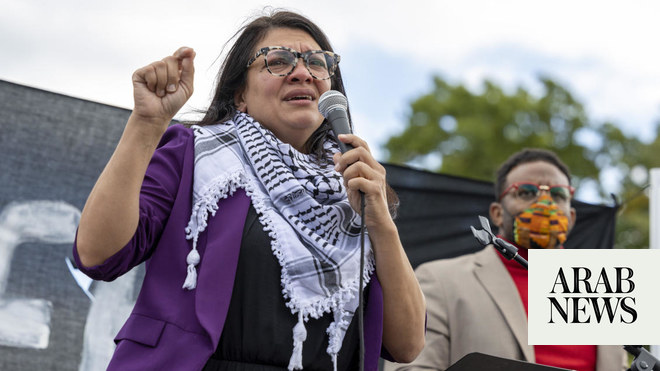
Rashida Tlaib this month won the Democratic Party’s primary election in Michigan’s 13th Congressional District, meaning she will be the party’s candidate for the district in elections for the US House of Representatives in November. The district is a Democratic stronghold, so she is very likely to soon be one of the first Muslim women and second Palestinian-American to serve in the US Congress.
As a female candidate, a left-wing progressive and a member of ethnic and religious minorities, Tlaib represents three major trends within the Democratic Party. At the same time, she won a close primary race largely because of her substantive experience as a local leader.
While American women remain significantly under-represented in elected positions, a record number are running for elected office this year. Most of this energy is in the Democratic Party, where women candidates have performed well in primaries, the elections to choose a party’s candidate for the general election in November. A recent statistical analysis by FiveThirtyEight found that female candidates in Democratic primaries were more likely to win than male rivals.
Even though Tlaib’s main competitor also was a woman, she is part of this wave of Democratic women winning primaries. There are many reasons why Democratic female candidates are doing so well within their party, but one reason reported by FiveThirtyEight is that the female candidates tend to have more experience as elected representatives than the male candidates. Tlaib fits this trend, as she has served three terms in Michigan’s state legislature.
Tlaib is also part of an effort by left-wing progressives to reshape the Democratic Party. The party’s progressive wing has had mixed results in primaries, but Tlaib won while strongly espousing democratic socialist views. For example, she supports a $15 minimum wage, free college tuition for “working families,” and “Medicare for All,” which would see the government pay for essential healthcare. Tlaib emphasizes her record of defending her community’s interests against powerful opponents, and some analysts have suggested that her approach demonstrates the importance of merging left-wing views with a practical focus on local issues.
Tlaib is likely to be one of the first Muslim women in Congress, probably along with her political ally, Ilhan Omar, who came to the US as a Somali refugee and who won the primary in Minnesota’s Fifth District. Tlaib is also likely to become the second Palestinian-American elected to Congress. Her status as a member of ethnic and religious minorities offers her opportunities to inspire other Muslims, Arab-Americans and women to seek political office.
As a female candidate, a left-wing progressive and a member of ethnic and religious minorities, Tlaib represents three major trends within the Democratic Party
Kerry Boyd Anderson
At the same time, her Muslim and Palestinian-American identities come with difficult challenges, such as discrimination. Additionally, the children of immigrants who take up leadership positions in the US often face conflicting demands: Pressure to represent the interests of their immigrant community and family back in their parents’ homeland versus pressure to strongly demonstrate their American identity and willingness to put US interests first.
Tlaib emphasizes that she takes pride in her Muslim and Palestinian identities and sees them as part of a broader focus on civil rights that includes standing up for the interests of African-Americans, Latino-Americans, immigrants and the poor. “I love that I’m Muslim, and I love that it’s such a powerful message,” Tlaib said in a recent interview with Bustle magazine, adding: “But I hope people remember why I’m really doing this, and why it’s about economic and social justice.”
Tlaib has long spoken about the importance of her Palestinian heritage, but, after her win in the primary vaulted her from the local stage to the national one, critics on different sides demanded that she make her views on the Israeli-Palestinian conflict clear. Arab-Americans make up a small percentage of Tlaib’s diverse district, and most of her other constituents probably do not want their representative to devote a lot of her energy to a foreign policy issue that is not a priority to them.
At first, Tlaib appeared to stumble under the pressure to explicitly state her positions regarding Palestine — taking personal offense at the questions and making broad statements that did not satisfy those demanding answers. This is unsurprising, as there is a steep learning curve when politicians move from a state-level position to a national one. After a few days, she seemed to find her footing. In an interview with In These Times, she clarified that she believes in a one-state solution to the Israeli-Palestinian conflict, noting that “separate but equal does not work;” supports the free speech rights of members of the Boycott, Divestment, Sanctions movement, while not declaring her personal support; and opposes US military aid to “a Netanyahu Israel” and other countries that do not support human rights. She added that “I am not going to dehumanize Israelis” and hopes that Israel will someday embrace Palestinians.
Many Americans will strongly disagree with Tlaib’s left-wing policy positions. Many Americans and Israelis will reject her criticisms of Israel. Palestinians might find it exciting to have a Palestinian woman who cares about their rights in the US Congress, but those with high expectations that she will champion their cause might be frustrated in the end. Her supporters — and some of her critics — will find the personal story of a mother, a member of ethnic and religious minorities, and the child of immigrants who worked hard to beat the socioeconomic odds inspiring. However, regardless of what anyone outside of Michigan’s 13th Congressional District thinks about her, it is Tlaib’s local community that will determine whether she will represent them.
Kerry Boyd Anderson is a writer and political risk consultant with more than 14 years’ experience as a professional analyst of international security issues and Middle East political and business risk. Twitter: @KBAresearch
Disclaimer: Views expressed by writers in this section are their own and do not necessarily reflect Arab News" point-of-view












